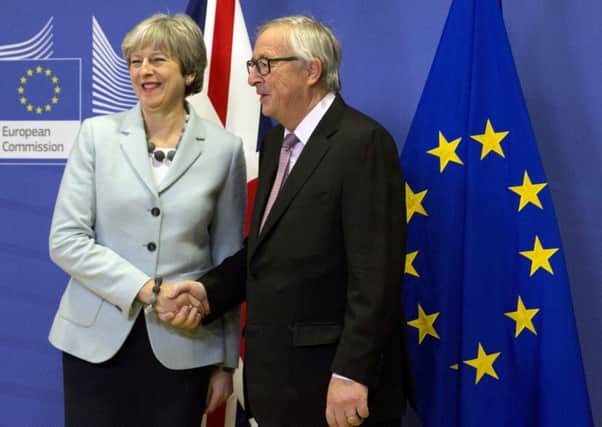Bernard Ingham: EU's awkward squad will still seek to put the boot in


His working life, often stretching to the dawn chorus, was spent over beer and sandwiches in smoke-filled rooms. It did not seem to do him much harm because when I last heard of him he was over 100.
We need that sort of experienced stamina for the next round of the Brexit negotiations now that Theresa May has cleared the way – somewhat expensively if you ignore the cost of staying in the European Union – for talks on our trade relations with the EU.
Advertisement
Hide AdAdvertisement
Hide AdIt will be a signal triumph for her if she pulls off an acceptable deal for the British people, given that the unelected bureaucrats in Brussels are used to taking member states to the cleaners. Not being elected, they are largely immune to public pressure and are, in any case, generally supported by France and Germany, who run the show.
To be blunt, I do not trust the 27 member states as a whole any further than I can throw them – which is nowhere in these geriatric days.
This is not because I am congenitally suspicious but because my attendance at 31 consecutive EU summits between 1979 and 1990 and the institution’s performance in the time since then have made me a jaundiced Jeremiah about the EU.
To be clear, I am not in the least opposed to voluntary European co-operation. As an outward looking people who do not pull up drawbridges, we are unlikely to change whatever the outcome of Brexit. We know where our duty lies: to European security in pursuit of our own interests.
Advertisement
Hide AdAdvertisement
Hide AdIn any case, it has always been clear we would never get off Scot-free leaving the EU.
In the months ahead we should never forget that it took Margaret Thatcher four years to win her “fish wife demand”, as Europhiles put it, for her money back – (ie) our disproportionate contribution to Brussels – at the 1979 Dublin summit. And then at Fontainebleau in 1984 she got only “two thirds of a loaf”.
I recall her signing the Single European Act in 1986 containing British provisos. Yet the ink was scarcely dry on the deal when they brazenly reneged on agreed unanimity by approving some social measures with a majority vote.
Then came Thatcher’s Bruges speech in 1988, warning the EC, as it then was, that it was going down the wrong route to a federal super-state and calling for a wider, looser community. And how did Brussels respond?
Advertisement
Hide AdAdvertisement
Hide AdWhy, we got ever increasing integration through the Maastricht and Lisbon treaties. Now, 20 years later, it is trying to build a European army and Martin Schulz, leader of Germany’s SDP in coalition talks with Angela Merkel, wants not just more integration but a full-blooded federation of 27 – or 28 if he can thwart the will of the British people.
With all this grating on our feelings it should have come as no surprise that we began to wonder what was the point in electing a Westminster Parliament when Brussels generated most of our ill-scrutinised laws.
Nor from now on should anyone be surprised if the EU continues to be awkward and demanding of us in trying to tie up a deal. We have had the temerity to flout their will and we must be seen to pay.
My experience of the EU teaches me that, to varying degrees among the 27, there are several fundamental differences between us and the continentals. For one thing, as Hugh Gaitskell implied in the early 1960s, we have not lived under the jackboot for 1,000 years. Our islands have been more or less secure from invasion.
Advertisement
Hide AdAdvertisement
Hide AdIt follows from this that a land border with other states breeds, in the light of history, uncertainty and an overwhelming desire for security.
Finally, there is Thatcher’s first law on handling Europe. In her efforts to secure a still elusive real single market, she realised that, unlike us, the continent sees law not as something to observe now but to aspire to observe sometime.
The lesson of all this is not to throw our caps over the windmill this week. It is not churlish but facing reality to recognise there is a long way to go and that there is many a slip twixt cup and lip.
Mrs May needs the nation’s support, stupid Tories please note, to provide the necessary muscle to secure a return of sovereignty. Conrad would come in very useful next year.